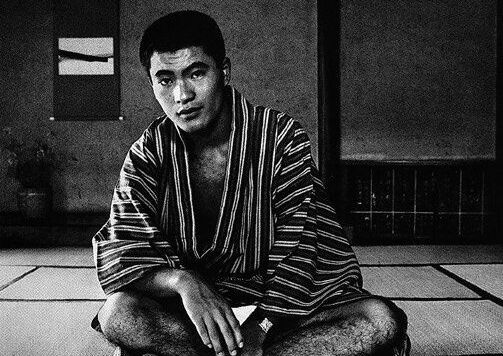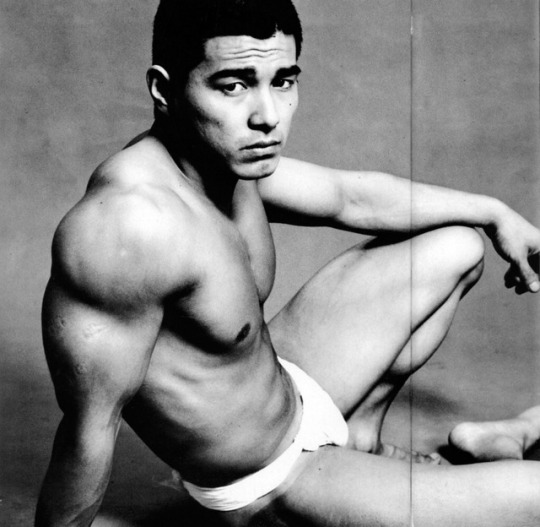#Yatō Tamotsu
Text

Tamotsu Yatō (Japanese, 1928-1973), from the series Otoku: Photo Studies of the Young Japanese Male, 1972
100 notes
·
View notes
Photo

Tamotsu Yatō (deceased)
Gender: Male
Sexuality: Gay
DOB: Born 1928
RIP: 1 January 1973
Ethnicity: Japanese
Occupation: Adult photographer, actor
Note: Responsible for pioneering Japanese homoerotic photography and creating iconic black-and-white images of the Japanese male
#Tamotsu Yatō#Yatō Tamotsu#Yato Tamotsu#lgbt history#male#gay#1928#rip#historical#asian#poc#japanese#photographer#adult photographer#actor#popular#popular post#200
274 notes
·
View notes
Photo

Yatō Tamotsu 矢頭 保 (Japan, 1928 - 1973) 1972 PHOTOGRAVURE
284 notes
·
View notes
Photo

Otoko by Tamotsu Yatō
418 notes
·
View notes
Photo

Yukio Mishima (三島 由紀夫) is the pen name of Kimitake Hiraoka (平岡 公威), a Japanese author, poet, playwright, actor, model, film director, founder of the Tatenokai, and nationalist. Mishima is considered one of the most important Japanese authors of the 20th century. He was considered for the Nobel Prize in Literature in 1968 but the award went to his countryman Yasunari Kawabata. His works include the novels Confessions of a Mask and The Temple of the Golden Pavilion, and the autobiographical essay Sun and Steel. His avant-garde work displayed a blending of modern and traditional aesthetics that broke cultural boundaries, with a focus on sexuality, death, and political change.
In 1955, Mishima took up weight training and his workout regimen of three sessions per week was not disrupted for the final 15 years of his life. In his 1968 essay Sun and Steel, Mishima deplored the emphasis given by intellectuals to the mind over the body. Mishima later also became very skilled at kendo, traditional Japanese swordsmanship.
Mishima was also an actor, and had a starring role in Yasuzo Masumura's 1960 film, Afraid to Die. He also had roles in films including Yukoku (directed by himself, 1966), Black Lizard (directed by Kinji Fukasaku, 1968) and Hitokiri (directed by Hideo Gosha, 1969). He also sang the theme song for Afraid to Die (lyrics by himself; music by Shichirō Fukazawa).
Mishima was featured as a photo model in Ba-ra-kei: Ordeal by Roses by Eikoh Hosoe, as well as in Young Samurai: Bodybuilders of Japan and Otoko: Photo Studies of the Young Japanese Male by Tamotsu Yatō. American author Donald Richie gave a short lively account of Mishima, dressed in a loincloth and armed with a sword, posing in the snow for one of Tamotsu Yato's photoshoots.
Mishima was active as a nationalist and founded his own right-wing militia, the Tatenokai. In 1970, he and three other members of his militia staged an attempted coup d'état when they seized control of a Japanese military base and took the commander hostage, then tried and failed to inspire a coup to restore the Emperor's pre-war powers. Mishima then committed ritual suicide by seppuku. The coup attempt became known as the "Mishima Incident".
Much speculation has surrounded Mishima's suicide. At the time of his death he had just completed the final book in his Sea of Fertility tetralogy. He was recognized as one of the most important post-war stylists of the Japanese language. Mishima wrote 34 novels, about 50 plays, about 25 books of short stories, and at least 35 books of essays, one libretto, as well as one film.
A 1985 biographical film by Paul Schrader titled Mishima: A Life in Four Chapters depicts his life and work; however, it has never been given a theatrical presentation in Japan.
On July 3, 1999, "Mishima Yukio Bungaku-kan" (三島由紀夫文学館, "Mishima Yukio Literary Museum") was opened in Yamanakako.
The Mishima Prize was established in 1988 to honor his life and works.
Daily inspiration. Discover more photos at http://justforbooks.tumblr.com
27 notes
·
View notes